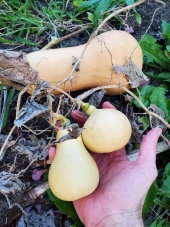Thank you for the reactions! I was never really thinking about giving up, but it’s heartwarming to see we’re not alone in this.
Chip, I’m going to remember what you said about the 1%

I actually had a good year last year without any fertiliser, compost or anything, just a bit of mulch (it was our first year and I just wanted to experiment a bit, didn’t have time for much
gardening in between paid work). This year we have all the old-straw-with-horse-manure we want, we’ve got a big pile of it waiting to be used at all times…
The vegetables were planted on the same field as last year, not on the exact same locations. Although last year, a neighbour ploughed the field completely, while this year we only dug trenches and applied mulch. The whole area is very heavily mulched, but maybe the heat was just a bit much… The weeds kind of took over in the spring for a bit and although we got rid of them (used them for mulch), but maybe they depleted the soil more than I anticipated.
Elijah, thanks for the tip on the back to Eden method! I’d never heard of it but just watched a (short)
video, sounds interesting… When we get a
wood chipper (hopefully after winter, when we’ve got tons of prunings to process) I’d love to try some of that!
We definitely need to do more flowers in the veggie garden - I had many around springtime (and we did have lots of ladybugs), but I didn’t put enough effort into keeping insect-attracting plants out there during the summer. And I’ve never had enough radishes to let them flower, will grow more this year!
I’ve been watching the
Justin Rhodes videos and am planning to let the
chickens in to the veggie garden come september (patch by patch, and with electric fencing around it). Have them scratch everything up, spread the mulch and fertilise a bit before I plant and sow…
Casie, what you say about 2 growing seasons is interesting - maybe I
should experiment with that as well… Now that I think of it, last year (it wasn’t as dry as now, and I didn’t water extra) the tomatoes did nothing in the middle of summer, but came out abundant in September. Maybe I should just show a bit more patience

Also I’ve been looking at theory a lot, but data like first frost / last frost dates and average rainfall / temperature a month don’t seem to be very reliable around here. So first on my to-do-list: I’m going to see if I’ve got any leftover seeds I could start now and plant out in a few weeks, see if we could get a better result in the after-summer (with a bit more rain, hopefully).
One thing I will definitely do differently next year, is to get out there and sow / plant stuff earlier - and plant more (more different varieties, different plants and just more in quantity). That's probably the biggest lesson I learned this year.
Local farmers want to be very helpful, but they mainly offer to come plough our
land (our neighbour was kind of upset that I planted our new fruit
trees in the “wrong” pattern as it would make it so much more difficult to plough with his big
tractor now) and spray. We sometimes (very quietly) say we'd like to try it without ploughing and spraying, which just makes them either laugh or swear

There’s a few people coming in from elsewhere who try
permaculture / organic / no-till /…, and we try to share results (and seeds) as much as we can… but as far as I know, we’re the only ones with no zucchini / squash / pumpkins this year…
And Casie, fingers crossed for your eggplant






 2
2


















 1
1




 1
1




 2
2










 1
1




 1
1




 1
1




 1
1










 There’s a few people coming in from elsewhere who try permaculture / organic / no-till /…, and we try to share results (and seeds) as much as we can… but as far as I know, we’re the only ones with no zucchini / squash / pumpkins this year…
There’s a few people coming in from elsewhere who try permaculture / organic / no-till /…, and we try to share results (and seeds) as much as we can… but as far as I know, we’re the only ones with no zucchini / squash / pumpkins this year…

 1
1




 1
1




 1
1














